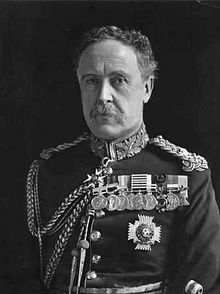Neville Lyttelton
| Sir Neville Lyttelton | |
|---|---|

General Sir Neville Lyttelton
|
|
| Born |
28 October 1845 Hagley, Worcestershire |
| Died | 6 July 1931 (aged 85) Royal Hospital Chelsea, London |
| Allegiance | United Kingdom |
| Service/branch | British Army |
| Years of service | 1865–1912 |
| Rank | General |
| Commands held |
Commander-in-Chief, Ireland Chief of the General Staff Commander-in-Chief, South Africa 4th Division 2nd Division 4th Brigade 2nd Brigade 2nd Battalion Rifle Brigade 1st Battalion Rifle Brigade |
| Battles/wars |
Fenian Raids Anglo-Egyptian War Mahdist War Second Boer War |
| Awards |
Knight Grand Cross of the Order of the Bath Knight Grand Cross of the Royal Victorian Order Mentioned in Despatches Order of Osmanieh (Ottoman Empire) |
| Relations | Charles Masterman (son-in-law) |
General Sir Neville Gerald Lyttelton, GCB, GCVO, PC (28 October 1845 – 6 July 1931) was a British Army officer from the Lyttelton family who served against the Fenian Raids, and in the Anglo-Egyptian War, the Mahdist War and the Second Boer War. He was Chief of the General Staff at the time of the Haldane Reforms and then became Commander-in-Chief, Ireland.
Born the son of 4th Baron Lyttelton and Mary Lyttelton (née Glynne) and educated at Eton College, Lyttelton was commissioned into the Rifle Brigade in January 1865. As a junior officer he was sent to Canada where he helped defeat the Fenian raids in 1866 and served as Secretary to the Oregon Boundary Commission in 1867. He was promoted to lieutenant on 14 July 1869, to captain on 13 October 1877 and to major on 22 February 1882. In 1880 he was made Private secretary to Hugh Childers, Secretary of State for War.
...
Wikipedia
